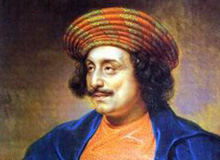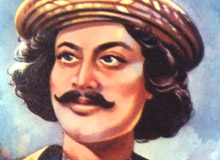Born: August 14, 1774
Died: September 27, 1833
Achievements
 Raja
Ram Mohan Roy is considered as the pioneer of modern Indian Renaissance
for the remarkable reforms he brought in the 18th century India. Among
his efforts, the abolition of the sati-pratha-a practice in which the
widow was compelled to sacrifice herself on the funeral pyre of her
husband-was the prominent. His efforts were also instrumental in
eradicating the purdah system and child marriage. In 1828, Ram Mohan Roy
formed the Brahmo Samaj, a group of people, who had no faith in
idol-worship and were against the caste restrictions. The title 'Raja'
was awarded to him by Mughal emperor Akbar, the second in 1831 when Roy
visited England as an ambassador of the King to ensure that Bentick's
regulation of banning the practice of Sati was not overturned.
Raja
Ram Mohan Roy is considered as the pioneer of modern Indian Renaissance
for the remarkable reforms he brought in the 18th century India. Among
his efforts, the abolition of the sati-pratha-a practice in which the
widow was compelled to sacrifice herself on the funeral pyre of her
husband-was the prominent. His efforts were also instrumental in
eradicating the purdah system and child marriage. In 1828, Ram Mohan Roy
formed the Brahmo Samaj, a group of people, who had no faith in
idol-worship and were against the caste restrictions. The title 'Raja'
was awarded to him by Mughal emperor Akbar, the second in 1831 when Roy
visited England as an ambassador of the King to ensure that Bentick's
regulation of banning the practice of Sati was not overturned.
Background
Raja Ram Mohan Roy was born on 14 August, 1774 to Ramakanta Roy and Tarini Devi in Murshidabad district, West Bengal. His father was a wealthy Brahmin and strictly performed the duties set by the religion. Ram Mohan himself was also devoted to lord Vishnu and in his 14th year, he wanted to become a monk but his mother, Tarini Devi objected to his desire.
Though his father Ramakanto was very orthodox but he wanted his son to have higher education and after the basic formal education in Sanskrit and Bengali in the village school, Ram Mohan was sent to Patna to study Persian and Arabic in a madrasa. After that he went to Benares (Kashi) for learning the intricacies of Sanskrit and Hindu scripture, including the Vedas and Upanishads. He learnt English language at the age of 22 years.
Father of Renaissance
 Ram
Mohan viewed education as a medium to implement the social reforms. So,
in 1815, Ram Mohan came to Calcutta and the very next year, started an
English College by putting his own savings. He was well aware that the
students should learn the English language and scientific subjects and
that's why he criticized the government's policy of opening only
Sanskrit schools. According to him, Indians would lag behind if they do
not get to study modern subjects like Mathematics, Geography and Latin.
Government accepted this idea of Ram Mohan and also implemented it but
not before his death. Ram Mohan was also the first to give importance to
the development of the mother tongue. His 'Gaudiya Byakaran' in Bengali
is the best of his prose works. Rabindranath Tagore and Bankimchandra
also followed the footsteps of Ram Mohan Roy.
Ram
Mohan viewed education as a medium to implement the social reforms. So,
in 1815, Ram Mohan came to Calcutta and the very next year, started an
English College by putting his own savings. He was well aware that the
students should learn the English language and scientific subjects and
that's why he criticized the government's policy of opening only
Sanskrit schools. According to him, Indians would lag behind if they do
not get to study modern subjects like Mathematics, Geography and Latin.
Government accepted this idea of Ram Mohan and also implemented it but
not before his death. Ram Mohan was also the first to give importance to
the development of the mother tongue. His 'Gaudiya Byakaran' in Bengali
is the best of his prose works. Rabindranath Tagore and Bankimchandra
also followed the footsteps of Ram Mohan Roy.
Freedom of Press
Ram Mohan Roy was a staunch supporter of free speech and expression and fought for the rights of vernacular press. He also brought out a newspaper in Persian called 'Miratul- Akhbar' (the Mirror of News) and a Bengali weekly called 'Sambad Kaumudi' (the Moon of Intelligence). In those days, items of news and articles had to be approved by the government before being published. Ram Mohan protested against this control by arguing that newspapers should be free and that the truth should not be suppressed simply because the government did not like it.
His Last Days
Raja Ram Mohan Roy, during his visit to United Kingdom as an ambassador of Akbar- the second, died of meningitis at Stapleton in Bristol on 27 September, 1833. He went there to request the British government to increase the royalty, received by the Mughal Emperor and to ensure that Lord Bentick's regulation of banning the practice of Sati was not overturned. Recently, the British government has named a street as 'Raja Rammohan Way' in the memory of Raja Ram Mohan Roy.
Died: September 27, 1833
Achievements
 Raja
Ram Mohan Roy is considered as the pioneer of modern Indian Renaissance
for the remarkable reforms he brought in the 18th century India. Among
his efforts, the abolition of the sati-pratha-a practice in which the
widow was compelled to sacrifice herself on the funeral pyre of her
husband-was the prominent. His efforts were also instrumental in
eradicating the purdah system and child marriage. In 1828, Ram Mohan Roy
formed the Brahmo Samaj, a group of people, who had no faith in
idol-worship and were against the caste restrictions. The title 'Raja'
was awarded to him by Mughal emperor Akbar, the second in 1831 when Roy
visited England as an ambassador of the King to ensure that Bentick's
regulation of banning the practice of Sati was not overturned.
Raja
Ram Mohan Roy is considered as the pioneer of modern Indian Renaissance
for the remarkable reforms he brought in the 18th century India. Among
his efforts, the abolition of the sati-pratha-a practice in which the
widow was compelled to sacrifice herself on the funeral pyre of her
husband-was the prominent. His efforts were also instrumental in
eradicating the purdah system and child marriage. In 1828, Ram Mohan Roy
formed the Brahmo Samaj, a group of people, who had no faith in
idol-worship and were against the caste restrictions. The title 'Raja'
was awarded to him by Mughal emperor Akbar, the second in 1831 when Roy
visited England as an ambassador of the King to ensure that Bentick's
regulation of banning the practice of Sati was not overturned.Background
Raja Ram Mohan Roy was born on 14 August, 1774 to Ramakanta Roy and Tarini Devi in Murshidabad district, West Bengal. His father was a wealthy Brahmin and strictly performed the duties set by the religion. Ram Mohan himself was also devoted to lord Vishnu and in his 14th year, he wanted to become a monk but his mother, Tarini Devi objected to his desire.
Though his father Ramakanto was very orthodox but he wanted his son to have higher education and after the basic formal education in Sanskrit and Bengali in the village school, Ram Mohan was sent to Patna to study Persian and Arabic in a madrasa. After that he went to Benares (Kashi) for learning the intricacies of Sanskrit and Hindu scripture, including the Vedas and Upanishads. He learnt English language at the age of 22 years.
Father of Renaissance
 Ram
Mohan viewed education as a medium to implement the social reforms. So,
in 1815, Ram Mohan came to Calcutta and the very next year, started an
English College by putting his own savings. He was well aware that the
students should learn the English language and scientific subjects and
that's why he criticized the government's policy of opening only
Sanskrit schools. According to him, Indians would lag behind if they do
not get to study modern subjects like Mathematics, Geography and Latin.
Government accepted this idea of Ram Mohan and also implemented it but
not before his death. Ram Mohan was also the first to give importance to
the development of the mother tongue. His 'Gaudiya Byakaran' in Bengali
is the best of his prose works. Rabindranath Tagore and Bankimchandra
also followed the footsteps of Ram Mohan Roy.
Ram
Mohan viewed education as a medium to implement the social reforms. So,
in 1815, Ram Mohan came to Calcutta and the very next year, started an
English College by putting his own savings. He was well aware that the
students should learn the English language and scientific subjects and
that's why he criticized the government's policy of opening only
Sanskrit schools. According to him, Indians would lag behind if they do
not get to study modern subjects like Mathematics, Geography and Latin.
Government accepted this idea of Ram Mohan and also implemented it but
not before his death. Ram Mohan was also the first to give importance to
the development of the mother tongue. His 'Gaudiya Byakaran' in Bengali
is the best of his prose works. Rabindranath Tagore and Bankimchandra
also followed the footsteps of Ram Mohan Roy.Freedom of Press
Ram Mohan Roy was a staunch supporter of free speech and expression and fought for the rights of vernacular press. He also brought out a newspaper in Persian called 'Miratul- Akhbar' (the Mirror of News) and a Bengali weekly called 'Sambad Kaumudi' (the Moon of Intelligence). In those days, items of news and articles had to be approved by the government before being published. Ram Mohan protested against this control by arguing that newspapers should be free and that the truth should not be suppressed simply because the government did not like it.
His Last Days
Raja Ram Mohan Roy, during his visit to United Kingdom as an ambassador of Akbar- the second, died of meningitis at Stapleton in Bristol on 27 September, 1833. He went there to request the British government to increase the royalty, received by the Mughal Emperor and to ensure that Lord Bentick's regulation of banning the practice of Sati was not overturned. Recently, the British government has named a street as 'Raja Rammohan Way' in the memory of Raja Ram Mohan Roy.
